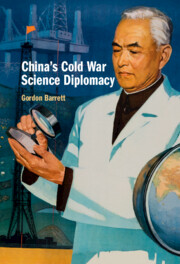Book contents
- China’s Cold War Science Diplomacy
- China’s Cold War Science Diplomacy
- Copyright page
- Dedication
- Contents
- Tables
- Acknowledgements
- Note on the Text
- Abbreviations
- Introduction
- 1 A Scientific United Front at Home and Abroad
- 2 Between Pugwash and the Party-State
- 3 ‘Friends and Comrades, We Fight against Imperialism’
- 4 Linking the Local, National, and International
- 5 A Spectrum of Propaganda and Scientific Exchange
- Conclusion
- Select Bibliography
- Index
3 - ‘Friends and Comrades, We Fight against Imperialism’
The Radical Evolution of China’s Science Diplomacy, 1960–1968
Published online by Cambridge University Press: 18 August 2022
- China’s Cold War Science Diplomacy
- China’s Cold War Science Diplomacy
- Copyright page
- Dedication
- Contents
- Tables
- Acknowledgements
- Note on the Text
- Abbreviations
- Introduction
- 1 A Scientific United Front at Home and Abroad
- 2 Between Pugwash and the Party-State
- 3 ‘Friends and Comrades, We Fight against Imperialism’
- 4 Linking the Local, National, and International
- 5 A Spectrum of Propaganda and Scientific Exchange
- Conclusion
- Select Bibliography
- Index
Summary
The combination of changing international circumstances alongside significant developments in China’s domestic politics made 1960 a turning point in Chinese international scientific outreach. Chapter 3 examines the impacts of these on Chinese engagement with the Pugwash Conferences on Science and World Affairs and the World Federation of Scientific Workers, considering the reasons for the significant divergence in how each was viewed and, consequently, those relationships evolved into the early years of the new decade. As had been the case in the 1950s, elite Chinese scientists and scientific organisations worked with foreign affairs officials, but in the context of the early 1960s this meant significantly adjusting and adapting their approaches to such external events and organisations. In all, Chinese science diplomacy via united front work was less well suited to the combative context of the Sino-Soviet split than when the two powers were not so overtly locked in competition for influence.
Keywords
- Type
- Chapter
- Information
- China's Cold War Science Diplomacy , pp. 99 - 132Publisher: Cambridge University PressPrint publication year: 2022

